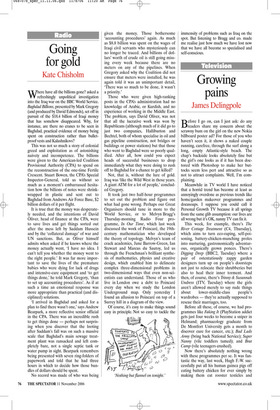Going for gold
Kate Chisholm
Where have all the billions gone? asked a refreshingly unpolitical investigation into the Iraq war on the BBC World Service. Baghdad Billions, presented by Mark Gregory (and produced by David Edmonds), set off in pursuit of the $18.4 billion of Iraqi money that has somehow disappeared. Why, for instance, are there no cranes to be seen in Baghdad, practical evidence of money being spent on construction rather than bulletproof vests and Kalashnikovs?
This was not so much a story of colonial greed and exploitation as of astonishing naivety and incompetence. The billions were given to the American-led Coalition Provisional Authority (CPA) to spend on the reconstruction of the one-time Fertile Crescent. Stuart Bowen, the CPA’s Special Inspector-General, told us without so much as a moment’s embarrassed hesitation how the billions of notes were shrinkwrapped in plastic and sent out to Baghdad from Andrews Air Force Base, $2 billion dollars of it per flight.
It is true that the money was desperately needed, and the intentions of David Oliver, head of finance at the CPA, were to save lives and get things sorted out after the mess left by Saddam Hussein and by the ‘collateral damage’ of war and UN sanctions. But, as Oliver himself admits when asked if he knows where the money actually went, ‘I have no idea. I can’t tell you whether the money went to the right people.’ It was far more important to save the lives of the premature babies who were dying for lack of drugs and intensive-care equipment and ‘to get things done,’ he told Mark Gregory, ‘than to set up accounting procedures’. As if at such a time an emotional response was more appropriate than practical (and disciplined) solutions.
‘I arrived in Baghdad and asked for a plan to find there wasn’t one,’ says Andrew Bearpark, a more reflective senior official in the CPA. There was an incredible rush to get things done — perhaps not surprising when you discover that the looting after Saddam’s fall was on such a massive scale that Baghdad’s main sewage treatment plant was ransacked and left completely bare, not a single septic tank or water pump in sight. Bearpark remembers being presented with seven ring-folders of paperwork and told that he had three hours in which to decide how those bundles of dollars should be spent.
No record was made of who was being given the money. Those bothersome ‘accounting procedures’ again. As much as $8.8 billion was spent on the wages of Iraqi civil servants who mysteriously can no longer be traced. And billions of dollars’ worth of crude oil is still going missing every week because there are no meters on any of the pipelines. When Gregory asked why the Coalition did not ensure that meters were installed, he was again told it was an unimportant detail, ‘There was so much to be done, it wasn’t a priority.’ Those who were given high-ranking posts in the CPA’s administration had no knowledge of Arabic, or Kurdish, and no experience of working in the Middle East. The problem, says David Oliver, was not that all the lucrative work was won by Republicans (although much of it did go to just two companies, Halliburton and Bechtel, both of whom specialise in oil and gas pipeline construction, not bridges or buildings or power stations) but that those who went to Baghdad were so poorly qualified. After all, how could you expect heads of successful businesses to drop immediately what they were doing to rush off to Baghdad for a chance to get killed?
Not, that is, without the lure of gold. Iraq was ‘like the Wild West in those years. A giant ATM for a lot of people,’ concluded Gregory.
It took just two half-hour programmes to set out the problem and figure out what had gone wrong. Perhaps our Great Organisers should tune in more to the World Service, or to Melvyn Bragg’s Thursday-morning Radio Four programme, In Our Time, which last week discussed the work of Poincaré, the 19thcentury mathematician who developed the theory of topology. Melvyn’s team of crack academics, June Barrow-Green, Ian Stewart and Marcus du Sautoy, led us through the Frenchman’s brilliant synthesis of mathematics, physics and creative design, which enabled him to delineate complex three-dimensional problems in two-dimensional ways that even non-scientists can understand. Those of us who live in London owe a debt to Poincaré every day when we study the London Underground map. Only yesterday I found an allusion to Poincaré on top of a Surrey hill in a diagram of the view.
Of course, it’s easy to make things sound easy in principle. Not so easy to tackle the immensity of problems such as Iraq on the spot. But listening to Bragg and co. made me realise just how much we have lost now that we have all become so specialised and self-conscious.


































































































 Previous page
Previous page